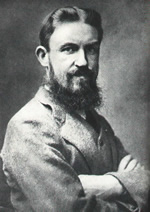Virtual Museum
Passion, Poison & Petrification
George Bernard Shaw
Over half Century since his death, it is hard to place perspective on the assertion that George Bernard Shaw was “the most important English playwright since Shakespeare”. But a perusal of the voluminous writings on him turns up this assertion in some form or another again and again. Then, of course, there are the works that in and of themselves make the case … Man and Superman and Pygmalion being preeminent.
George Bernard Shaw was born on July 26, 1856 in Ireland but moved to England and rarely returned. Although Shaw had experimented with drama at various times during his early writing days, it was his collaboration with William Archer in 1884 which produced Shaw's first serious dramatic work. The play, Widower's Houses, was abandoned for eight years but finally completed and staged in 1892 by the Independent Theatre Society. Shaw's career as a dramatist began slowly with his plays unappreciated or, as in the case of Mrs. Warren’s Profession, banned. But with the production of Man and Superman in 1905 his fame as a playwright was established.
 Shaw during his peak writing years
Shaw during his peak writing yearsOne of Shaw's greatest achievements was his invention of the theater of ideas, by insisting that the theater provide some moral instruction. In the process he also created a new genre, the serious farce. The serious farce consisted of using the techniques of comedy to advance serious views on humanity, society, and political systems. His plays, criticism, and political conscience all helped shape the theater of his time and after. In 1925 he was awarded the Nobel Prize for Literature. Shaw accepted the honor but refused the money. He was an academy award nominee in 1938 for his screenplay adaptation of Pygmalion. Later Pygmalion, of course, became the basis of My Fair Lady.
Shaw died November 2, 1950 at the age of 94.
Shaw liked to classify his works into two categories: “Plays Pleasant” and “Plays Unpleasant”. Passion Poison Petrification, (or The Fatal Gazogene) was written in 1905 and is a little known one act, but can be considered to straddle the line between the two categories. Combining comic farce, social satire, and dark crimes of the heart with downright surrealistic elements, Passion shares characteristics of his larger works in both categories, while not quite fitting completely into either.
Passion translates to audio drama quite nicely, as it takes place in a single place with a small cast and with clear action, and the surreal elements lend themselves to this format well. Our production made a few very small changes, one visual joke relating to Magnesia undressing before bed is omitted, and a few words have been added to a few lines in order to amplify visual points or clarify the character being spoken to in dialog.

 Shaw as most often depicted
Shaw as most often depicted